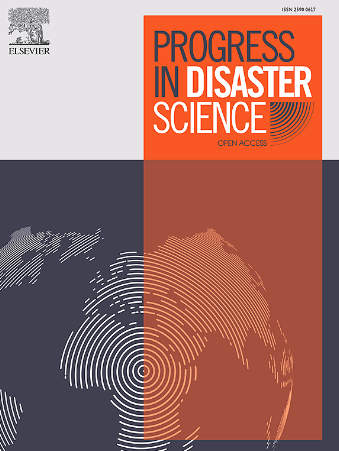Data-driven innovations in disaster risk management: Advancing resilience and sustainability through big data analytics
IF 3.8
Q3 ENVIRONMENTAL SCIENCES
引用次数: 0
Abstract
The integration of Big Data Analytics (BDA) into Disaster Risk Management (DRM) presents transformative opportunities to enhance decision-making and foster environmental sustainability across preparedness, response, recovery, and resilience. This study investigates the factors influencing BDA adoption in DRM using an integrated Technology-Organization-Environment and Diffusion of Innovation (TOE-DOI) framework. Survey data collected from academic participants with backgrounds in statistics, data analysis, and quantitative methods, along with technical, management, and disaster response professionals, were analyzed using ordinal logistic regression to assess the impact of technological, organizational, and environmental predictors. Key findings show that technological enablers drive BDA adoption by enhancing prediction and efficiency, while organizational readiness supports sustained integration. Stakeholder collaboration promotes adoption through improved coordination. In contrast, regulatory and competitive factors were not significant. The study provides actionable insights for advancing DRM through multidisciplinary strategies that align BDA integration with sustainability goals, emphasizing its potential to support resilient systems and informed decision-making in the face of complex environmental challenges.
灾害风险管理中的数据驱动创新:通过大数据分析提高复原力和可持续性
将大数据分析(BDA)整合到灾害风险管理(DRM)中,为在备灾、响应、恢复和复原过程中加强决策和促进环境可持续性提供了变革性机会。本研究采用技术-组织-环境与创新扩散(TOE-DOI)整合框架,探讨DRM中BDA采用的影响因素。从具有统计学、数据分析和定量方法背景的学术参与者以及技术、管理和灾害应对专业人员那里收集的调查数据,使用有序逻辑回归来评估技术、组织和环境预测因素的影响。主要发现表明,技术推动者通过增强预测和效率来推动BDA的采用,而组织准备支持持续集成。涉众协作通过改进的协调促进采用。相比之下,监管和竞争因素不显著。该研究为通过多学科战略推进DRM提供了可行的见解,这些战略使BDA与可持续发展目标相结合,强调了其在面对复杂环境挑战时支持弹性系统和明智决策的潜力。
本文章由计算机程序翻译,如有差异,请以英文原文为准。
求助全文
约1分钟内获得全文
求助全文
来源期刊

Progress in Disaster Science
Social Sciences-Safety Research
CiteScore
14.60
自引率
3.20%
发文量
51
审稿时长
12 weeks
期刊介绍:
Progress in Disaster Science is a Gold Open Access journal focusing on integrating research and policy in disaster research, and publishes original research papers and invited viewpoint articles on disaster risk reduction; response; emergency management and recovery.
A key part of the Journal's Publication output will see key experts invited to assess and comment on the current trends in disaster research, as well as highlight key papers.
 求助内容:
求助内容: 应助结果提醒方式:
应助结果提醒方式:


